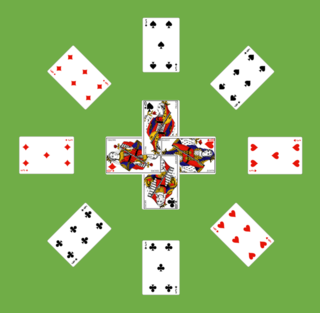Related Research Articles

Games of patience, or (card) solitaires as they are usually called in North America, have their own 'language' of specialised terms such as "building down", "packing", "foundations", "talon" and "tableau". Once learnt they are helpful in describing, succinctly and accurately, how the games are played. Patience games are usually for a single player, although a small number have been designed for two and, in rare cases, three or even four players. They are games of skill or chance or a combination of the two. There are three classes of patience grouped by object.

Yukon is a type of patience or solitaire card game using a single deck of playing cards like Klondike, but there is no deck or stock, and manipulation of the tableau works differently.

Pyramid is a patience or solitaire game of the Simple Addition family, where the object is to get all the cards from the pyramid to the foundation.

Clock or Sundial is a luck-based patience or solitaire card game with the cards laid out to represent the face of a clock. It is closely related to Travellers.

Quadrille is the name of two loosely related card games of the Patience or solitaire type which are often confused. Both use a pack of 52 playing cards. The earlier one was also known as La Française or Royal Quadrille, the slightly later one as Captive Queens. The name is derived from the desired outcome of the earlier game in which the four Kings and Queens are arranged in a square formation as in the European dance of quadrille that was fashionable in the 18th and 19th centuries.
Labyrinth is a patience or card solitaire game which uses a pack of 52 playing cards. Despite the fact that the word labyrinth is synonymous with maze, this game is very different in its manner of play and dealing from the game of Maze, and should not be confused with it. Labyrinth does however have similar play to the game of Babette – both being blockades – and the spatial puzzle in which cards become available is also reminiscent of Crazy Quilt.
Fourteen Out is a Patience card game played with a deck of 52 playing cards. As this game involves carrying off cards with a fixed sum, it belongs to the same family of games as Pyramid. The name refers to the goal of each turn to make pairs that add up to 14.

Baroness is a patience or card solitaire that is played with a single deck of 52 playing cards. It is similar to other members of the Simple Addition family and is also distantly related to Aces Up.
Capricieuse is a solitaire card game which is played using two decks of playing cards.
Emperor is an English patience or solitaire card game which is played using two packs of playing cards. Although similar to other members of the large Napoleon at St Helena family, Emperor introduced the unique and distinguishing feature of worrying back as well as the novel term "sealed packet".
Precedence is a patience or card solitaire game which uses two packs of playing cards. It is a building game where the playing does not have to worry about a tableau or playing area.

Queen's Audience, sometimes known as King's Audience, is a pictorial patience or solitaire card game which uses a single pack of 52 playing cards. It is so named because the Jacks and their 'entourage' end up adjacent to their respective Queens as if having an audience with them.
Leoni's Own is a 19th century American card solitaire played with two decks of playing cards shuffled together. This game may have come from Austria, takes approximately 20 minutes and is described as medium regarding difficulty and also uses an ingenious method called weaving. It is often confused by card game book writers with Weaver's which has a similar mode of play but different rules and terminology.
Deuces or Twos is a patience or card solitaire game of English origin which is played with two packs of playing cards. It is so called because each foundation starts with a Deuce, or Two. It belongs to a family of card games that includes Busy Aces, which is derived in turn from Napoleon at St Helena.
Cribbage Squares, occasionally Cribbage Square, is a patience or card solitaire based on Cribbage which can be played using a deck of playing cards. This game works the same way as Poker Squares, but with cribbage scoring.

Fortune's Favor or Fortune's Favour is a patience or card solitaire which is played with a deck of 52 playing cards. It is so-called probably because the chances of winning are completely on the player's side. It is a significantly simplified version of the game Busy Aces, a member of the Forty Thieves family of solitaire games.
Good Thirteen is a simple, German patience game for one person, played using a French pack of 52 playing cards. It also goes under the name Thirteens.
Eight Cards is a simple, German patience game for one player, that is played with a French pack of 52 cards.
Simple Addition or Totals is a family of patience or card solitaire games that share certain aims and procedures.
